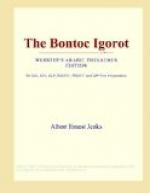The fowl was then turned over and around in the flame until all its feathers were burned off. Its crop was torn out with the fingers. The ax was struck blade up solid in the ground, and the legs of the chicken cut off from the body by drawing them over the sharp ax blade, and they were put at once into the pot. An incision was cut on each side of the neck, and the body torn quickly and neatly open, with the wings still attached to the breast part. A glad exclamation broke from the man when he saw that the gall of the fowl was dark green. The intestines were then removed, ripped into a long string, and laid in the basket. The back part of the fowl, with liver, heart, and gizzard attached, went into the now boiling pot, and the breast section followed it promptly. Three or four minutes after the bowl of rice was placed immediately in front of the man, and the breast part of the chicken laid in the bowl on the rice. Then followed these words: “Now the gall is good, we shall live in the pueblo invulnerable to disease.”
The breast was again put in the pot, and as the basket was packed up in preparation for departure the anito of ancestors were invited to a feast of chicken and rice in order that the ceremony might be blessed.
At the completion of this supplication the Pa’-tay shouldered his basket and hastened homeward by a different route from which he came.
If a chicken is used in this rite it is cooked in the dwelling of the priest and is eaten by the family. If a pig is used the old men of the priest’s ato consume it with him.
The performance of the rite of this last day is a critical half hour for the town. If the gall of the fowl is white or whitish the palay fruitage will be more or less of a failure. The crop last year was such — a whitish gall gave the warning. If a crow flies cawing over the path of the Pa’-tay as he returns to his dwelling, or if the dogs bark at him, many people will die in Bontoc. Three years ago a man was killed by a falling bowlder shortly after noon on this last day’s ceremonial — a flying crow had foretold the disaster. If an eagle flies over the path, many houses will burn. Two years ago an eagle warned the people, and in the middle of the day fifty or more houses burned in Bontoc in the three ato of Pokisan, Luwakan, and Ungkan.
If none of these calamities are foretold, the anito enemies of Bontoc are not revengeful, and the pueblo rests in contentment.




